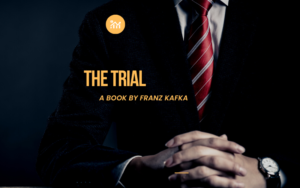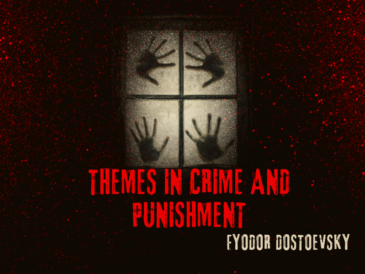Introduction
“The Trial” is a novel written by Franz Kafka, published in 1925, a year after the author’s death. The book tells the story of Josef K., a bank clerk who is arrested and prosecuted for an unknown crime. The novel is widely regarded as a masterpiece of existentialist literature, and its themes of alienation, bureaucracy, and power have made it a classic in modern literature.
Kafka’s writing style is know for its use of surrealism and absurdity, which gives the novel a dreamlike quality that adds to the overall sense of uncertainty and confusion experienced by the protagonist.
Moreover, throughout the novel, Josef K. navigates a labyrinthine legal system, trying to find out what he has been accused of and who his accusers are, all while facing the existential dread of his own mortality.
The novel has been the subject of much critical analysis and interpretation, with scholars and readers alike trying to decipher the meaning behind Kafka’s writing. Some have argued that the novel is a commentary on the dehumanizing effects of bureaucracy and the arbitrary nature of power, while others have seen it as a reflection on the human condition and the search for meaning in an absurd world.
Despite its difficult subject matter, “The Trial” remains a popular and influential work of literature. It has been adapted into numerous films, plays, and operas, and has inspired countless artists and writers across the world.
Themes
“The Trial” by Franz Kafka is a novel that explores a range of themes and ideas, many of which are still relevant today. Here are some of the key themes in the novel:
Alienation: One of the most prominent themes in “The Trial” is the sense of alienation experienced by the protagonist, Josef K. Throughout the novel, he is cut off from the rest of society, both by his legal troubles and by his own sense of isolation.
Bureaucracy: The novel also explores the dehumanizing effects of bureaucracy. Josef K. is caught up in a complex and labyrinthine legal system, which seems to have no clear rules or guidelines. This bureaucratic nightmare creates a sense of powerlessness and confusion for the protagonist.
Power: Another key theme in the novel is the arbitrary nature of power. Josef K. is constantly at the mercy of those in authority, but it is never clear who is pulling the strings or why.
Existentialism: “The Trial” is also a classic example of existentialist literature. The novel explores the search for meaning and purpose in an absurd and chaotic world, and the sense of dread that comes with the realization that life is ultimately meaningless.
Furthermore, the novel also touches on the concept of freedom, or the lack thereof. Josef K. is trapped in a legal system that seems to have no escape, and his attempts to fight against it only seem to make things worse.
Guilt: Finally, “The Trial” is a novel that explores the idea of guilt. Josef K. is never quite sure what he has been accused of, but he is consumed by a sense of guilt nonetheless. This theme speaks to the human tendency to self-blame, even in the absence of clear evidence or justification.
Characters
“The Trial” by Franz Kafka is a novel that features a range of interesting and complex characters. Here are some of the key characters in the novel:
Josef K.: The protagonist of the novel, Josef K. is a bank clerk who is arrest and prosecuted for an unknown crime. Throughout the novel, he tries to navigate the complex legal system and find out what he has been accused of.
Fraülein Bürstner: Fraülein Bürstner is Josef K.’s neighbor and love interest. She is initially sympathetic to Josef K.’s plight but later becomes distant and unapproachable.
However, Huld is one of the lawyers who represents Josef K. in his trial. He is old and feeble, and his advice and guidance are often contradictory.
Leni: Leni is Huld’s nurse and mistress. She becomes infatuated with Josef K. and helps him in his case, but her motives are unclear.
The Priest: The Priest is a mysterious figure who appears to offer Josef K. spiritual guidance. However, his advice is cryptic and unhelpful.
The Examining Magistrate: The Examining Magistrate is the official in charge of Josef K.’s case. He is a shadowy figure who seems to wield immense power, but his motivations and intentions are never made clear.
Each of these characters adds to the sense of confusion and uncertainty that permeates the novel. Their motivations and intentions are often unclear, leaving the reader to speculate about their true roles in the story.
Despite this ambiguity, the characters in “The Trial” are all fascinating and complex, and they contribute to the overall sense of dread and unease that is a hallmark of Kafka’s writing.
Symbolism
“The Trial” by Franz Kafka is a novel that is rich in symbolism and imagery. Here are some of the key symbols in the novel:
The Court: The Court is one of the most important symbols in the novel. It represents the opaque and mysterious legal system that Josef K. is caught up in. The Court is never clearly defined or explained, leaving the reader to wonder about its true nature and purpose.
Moreover, the Doorkeeper is a symbol of the arbitrary nature of power. He guards the entrance to the Court, but it is never clear who gave him this authority or why.
The Cathedral: The Cathedral is a symbol of hope and redemption. It represents a spiritual sanctuary that Josef K. is drawn to, but ultimately finds inaccessible.
The Whipper: The Whipper is a symbol of punishment and violence. He appears in a dream that Josef K. has and represents the brutal and arbitrary nature of the legal system.
The Painting: The Painting is a symbol of ambiguity and interpretation. It hangs in the apartment of Fraülein Bürstner and is subject to multiple interpretations, just like the events of the novel.
The Bank: The Bank is a symbol of modernity and rationality. It represents the world that Josef K. is familiar with, but also the world that he is trying to escape from.
Each of these symbols adds depth and complexity to the novel, and invites the reader to interpret the story in multiple ways. Whether you see “The Trial” as a commentary on power and bureaucracy, or a meditation on the search for meaning in an absurd world, the novel’s symbolism is an important part of its enduring appeal.
Themes
“The Trial” by Franz Kafka is a novel that explores a range of complex themes. Here are some of the key themes in the novel:
Power and Bureaucracy: “The Trial” is often seen as a critique of power and bureaucracy. The Court, with its opaque and labyrinthine legal system, is a symbol of the arbitrary exercise of power. Josef K. is caught up in this system and is unable to understand or escape from it.
Alienation: Josef K. is a deeply alienated character. He feels disconnected from the world around him and is unable to form meaningful relationships. This sense of alienation is heightened by the absurd and surreal nature of the events in the novel.
Guilt and Innocence: One of the central themes in the novel is the idea of guilt and innocence. Josef K. is accused of a crime, but he is never told what he has done wrong. This raises questions about the nature of guilt and innocence, and whether it is possible to be truly innocent in a world where the legal system is so opaque and arbitrary.
Existential Angst: “The Trial” is often seen as a quintessential work of existentialist literature. The novel explores the themes of alienation, isolation, and the search for meaning in an absurd world. Josef K.’s struggle to understand his place in the world is a reflection of the existential angst that many people feel in the modern era.
Absurdity of Life
“The Trial” by Franz Kafka is a novel that explores the absurdity of life. Here are some of the ways that the novel portrays this theme:
The Surreal and Absurd Events: The events in the novel are surreal and absurd. Josef K. is accused of a crime but is never told what he has done wrong. The legal system is opaque and labyrinthine, with no clear rules or procedures. The events that unfold are often bizarre and seemingly random.
However, Josef K. is a character who lacks agency. He is caught up in a system that he cannot understand or control. He is subject to the whims of the Court and its representatives, and is unable to make meaningful choices about his own life.
The Lack of Meaning: One of the key themes in the novel is the search for meaning in an absurd world. Josef K. is unable to find meaning in his life, and the events that unfold seem to have no clear purpose or goal.
The Disconnection from Reality: Josef K. is disconnected from the reality around him. The events that unfold seem to exist in a separate realm of absurdity and surrealism. This disconnection adds to the sense of absurdity in the novel.The Inevitability of Death: The novel is permeated by a sense of mortality and death.
The Psychological Aspects
“The Trial” by Franz Kafka is a novel that delves into the psychological aspects of the human mind. Here are some of the ways that the novel explores this theme:
Guilt and Innocence: One of the central themes of the novel is the question of guilt and innocence. Josef K. is accuse of a crime, but he is never told what he has do wrong. He struggles to understand his own guilt or innocence, and the novel raises questions about the nature of guilt and the ways in which it is imposed upon individuals.
Therefore, novel is permeated by a sense of paranoia and anxiety. Josef K. is constantly worried about being accused of a crime, and he becomes increasingly paranoid as the novel progresses. The sense of anxiety that permeates the novel reflects the psychological toll that the legal system can take on individuals.
Power and Control: The legal system in the novel is portrayed as a powerful and controlling force. The Court and its representatives hold all the power, and individuals like Josef K. are subject to their whims. The novel raises questions about the nature of power and control, and the ways in which they can be abused.
In last, Josef K. is a character who is alienated and isolated from the world around him. He struggles to form meaningful connections with other people, and he is increasingly isolated as the novel progresses. The sense of alienation and isolation that pervades the novel reflects the psychological toll that the legal system can take on individuals.





